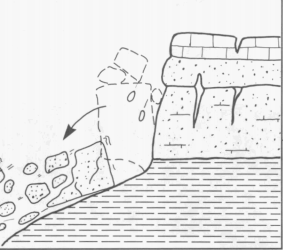Geography
Landslide in Kodagu
- 27 Aug 2020
- 3 min read
Why in News
Recently, due to heavy rain, numbers of landslides occurred in many parts of India.
Key Points
- Landslides:
- A landslide is defined as the movement of a mass of rock, debris, or earth down a slope.
- They are a type of mass wasting, which denotes any downward movement of soil and rock under the direct influence of gravity.
- The term landslide encompasses five modes of slope movement: falls, topples, slides, spreads, and flows.
- Causes:
- Slope movement occurs when forces acting downward (mainly due to gravity) exceed the strength of the earth materials that compose the slope.
- Landslides are caused due to three major factors: geology, morphology, and human activity.
- Geology refers to characteristics of the material. The earth or rock might be weak or fractured, or different layers may have different strengths and stiffness.
- Morphology refers to the structure of the land. For example, slopes that lose their vegetation to fire or drought are more vulnerable to landslides.
- Vegetation holds soil in place, and without the root systems of trees, bushes, and other plants, the land is more likely to slide away.
- Human activity which include agriculture and construction increase the risk of a landslide.
- Region:
- Continent-wise, Asia suffers the maximum damages/losses due to landslides and within that, South-Asian nations are the worst sufferers including India which is one of the worst affected by landslides.
- Mitigation:
- Restriction on the construction and other developmental activities such as roads and dams in the areas prone to landslides.
- Limiting agriculture to valleys and areas with moderate slopes.
- Control on the development of large settlements in the high vulnerability zones.
- Promoting large-scale afforestation programmes and construction of bunds to reduce the flow of water.
- Terrace farming should be encouraged in the northeastern hill states where Jhumming (Slash and Burn/Shifting Cultivation) is still prevalent.





